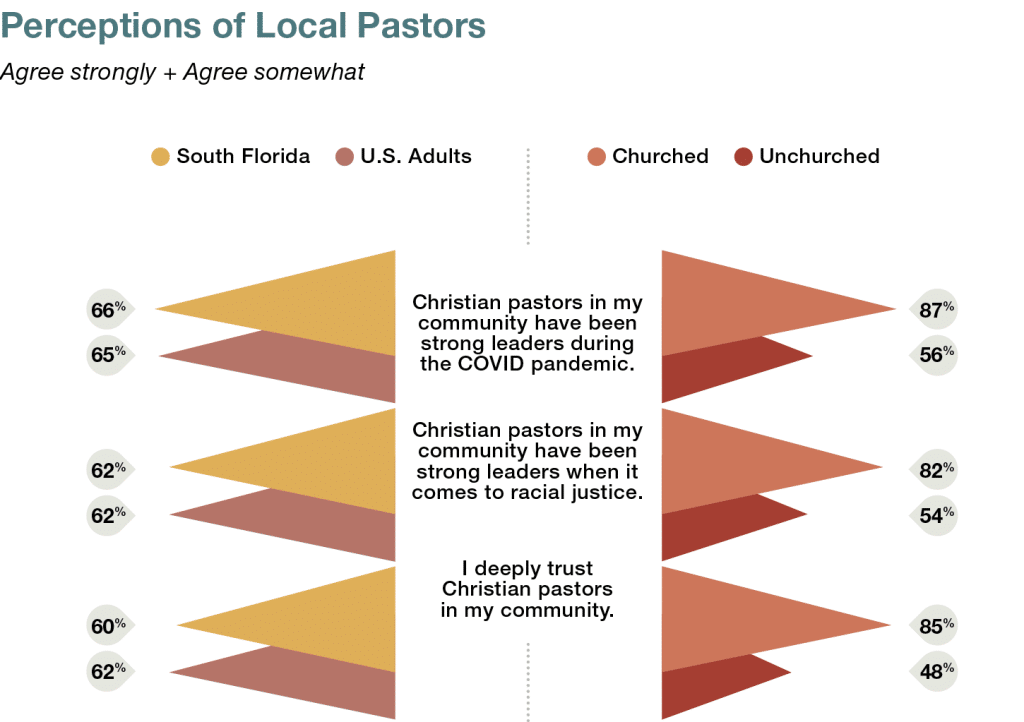
Self-awareness is one of the keys to emotional intelligence. It’s also a key to growth.
With that in mind, some recent research by the Barna Group through their Barna Cities initiative shows the church, in addition to the many well-documented challenges it’s facing, might have an emerging self-awareness issue.
The self-awareness gap, as you’ll see below, is a gap between how non-Christian people see the church versus how people who attend church see it. It’s also a generational gap.
Essentially, the gap is this: The younger you are and the more unchurched you are, the less favorably you see the church. The older and more churched you are, the more favorably you see the church.
As the data over the years accumulates, the verdict is in: We know what unchurched people think of the church. It’s not great.
When the people you’re trying to reach struggle with you, it’s harder to reach them.
Which is where self-awareness comes in. It’s hard to improve on a problem you don’t know you have. Once you see it, you can address it.
I say this not to pile on as yet-another critic (I’ve invested much of my life in the local church) but as a way of helping us find a better way into the future.
With that in mind, here is some fresh data showing the extent of the self-awareness gap.
As the data over the years accumulates, the verdict is in. We know what non-Christian people think of the church. It's not great. Click To Tweet1. Only 21% of Non-Christian People have a Positive Perception of the Local Church

One of the sharpest differences in this round of research is that 80% of practicing Christians have a positive view of the church. Only 21% of non-Christians think of the church in a positive way.
That’s a startling gap.
80% of practicing Christians have a positive view of the church. Only 21% of non-Christians think of the church in a positive way. That's a startling gap. Click To TweetOn the positive front, as the data on the left and in the center of the chart above shows, generally speaking, those who attend church regularly really appreciate what the church does both for them and others. And I would be among those who deeply appreciate the church’s work when we get it right.
The challenge is, though, that only one in five non-Christians see it that way.
That creates an enormous barrier when you’re trying to connect with unchurched people. When you’re connecting with an unchurched person, it’s easy to think on a scale of 1-10; you’re starting at a three or a zero. But the research shows that perhaps you’re starting from minus five or minus eight.
You can still bridge that gap. Nothing is impossible.
But when you realize first that there is a perception gap and second that it’s a big one, you’ll be better positioned to bridge it. I have a few ideas at the end of this post to help you think through how to do that.
When you're connecting with an unchurched person, it's easy to think, on a scale of 1-10, you're starting at a three or a zero. But the research shows that perhaps you're starting from minus five or minus eight. Click To Tweet2. Half of Non-Christian Americans Don’t Trust Local Pastors

The right-hand column shows another gap between how deeply Christians trust pastors in their community and how non-Christians do.
85% of Christians trust the Christian pastors in their community. Less than half of non-Christians feel the same way.
85% of Christians trust the Christian pastors in their community. Less than half of non-Christians feel the same way. Click To TweetSimilarly, there’s a 30-point gap between how Christians and non-Christians see local pastors providing strong leadership on racial justice and COVID.
Being able to trust church leaders in general and on issues like crisis leadership and racial justice matters because trust, at its heart, is about confidence.
Without trust, everything breaks down.
People generally don’t follow leaders they don’t like or trust.
People generally don't follow leaders they don't like or trust. Click To Tweet3. Millennials Think The Local Church is Detached From The Real Issues People Are Facing

Another trend that surfaced in the research is that, in several areas, church-going Millennials had a more negative view of the church than their older church-attending counterparts.
While Millennials were slightly more likely to think of church leaders as hypocritical and judgmental, they are twice as likely as Boomers to think that their church was detached from the real issues facing their community.
In a similar vein, Millennials were more likely to say that Christian pastors are out of touch with the needs of their community and that pastors seem more focused on growing their church and not on community transformation.
That’s evidence of a growing generational gap about social issues and the expectation of younger generations to see their church addressing the broader social issues of the day.
The challenge here for church leaders is that it’s difficult to reach a community that the next generation doesn’t believe you care about.
Naturally, if you do care about your community (as many church leaders do), it’s probably important to have some evidence that that’s the case beyond virtue signaling or token gestures.
A deep investment in the health and well-being of the people who live in the community you’re trying to reach is not only the right thing; it’s a step toward ushering them into the hope and love of the Gospel.
Millennials are twice as likely as Boomers to think that their church was detached from the real issues facing their community. Click To TweetAbout South Florida…It’s a Great Microcosm
Again, while some of the data is particular to South Florida, this has far less to do with Florida than with national trends that have surfaced for years.
If you’re worried that it’s too South Florida, know that, especially in the last year, South Florida has become a haven for tech entrepreneurs, founders, and venture capitalists.
It’s hardly just a retirement haven anymore. It’s just one drill down on a much wider generational and societal phenomenon. An increasingly mainstream, younger, and progressive demographic.
So, What Does This Mean?
The truth is a great place to start.
It would be easy, looking at the data, to see that the church has an image problem. I don’t think that’s the case.
While it’s certainly not the whole story, and while Christians have a positive view of the church, the truth is that the church has been harsh, judgmental, exclusionary, and, too often, abusive. These aren’t qualities people should expect from Christians, but too often, that’s exactly what Christians have shown them.
The church has been harsh, judgmental, exclusionary and too often, abusive. These aren't qualities people should expect from Christians, but too often, that's exactly what Christians have shown them. Click To TweetSo what do you do?
The right response isn’t better “PR”; it’s life change. The right response isn’t getting mad at non-Christians who don’t see the better side of the church or the potential of the church.
Instead, repentance, humility, reconciliation, and a new reality moving forward are good places to start.
When overcoming perception gaps as large as this data reveals, one of the most important things church leaders and individual Christians can do is to be the opposite of what non-Christian people would expect you to be. Fortunately for Christians, the opposite of what most people expect is pretty much what Jesus embodied.
The cure for the problem is to embrace more of what we are supposed to be authentically.
Be loving. Compassionate. Kind. Gracious. Curious. Embracing. Genuine.
Living out an ethic of love is a great place to start.
The mystery of why people are walking away from the church is less of a mystery all the time.
If Christians become more like the authentic church, more people will want to be part of it. The less we do, the more they don’t.
If Christians become more like the authentic church, the more people will want to be part of it. The less we do, the more they don't. Click To Tweet